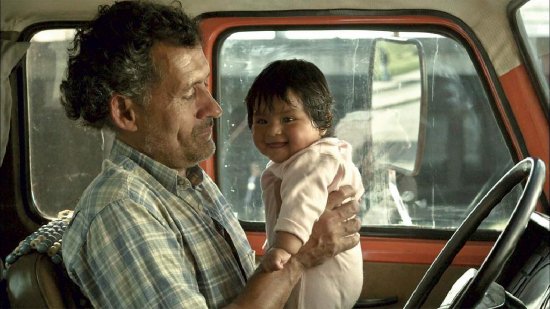Review for Las Acacias (2011)
Pablo Giorgelli's debut feature film (previously, in 1993, he directed a documentary short called El Ultimo Sueno) Las Acacias (2011), which incidentally picked up three awards at this years Cannes Film Festival, is a slow-paced road movie which focusses predominantly on how emotions and a relationship between two strangers can gradually transform within a relatively short space of time.
When the three of them begin the journey to Buenos Aires in Ruben's truck, there is very little dialogue, as Ruben calculatingly peers out of the window at the road ahead, and the surrounding scenery as well as at Aniha and her young mother, Jacinta. Jacinta occasionally glances over at Ruben, perhaps in an attempt to engage his attention. What is interesting here, is that we often feel as if we are the fourth passenger in the vehicle, an innocent bystander perhaps. Much like Jacinta, we try to decipher Ruben's psyche throughout much of the film's lack of dialogue; what is he thinking? And perhaps just as importantly, what do we know about his personal life?
Las Acacias' aesthetic is somewhat akin to that of an observational documentary, in that the camera stays close to the film's subjects (Ruben, Jacinta and also the young Aniha) and remains largely unobtrusive. We always seem to be close to Ruben, even when he showers and consumes food at local eateries, activities which suggests the monotonous and habitual nature of his everyday existence (Ruben drives cargos of timber from Paraguay to Buenos Aires).
Furthermore, the notion that Las Acacias's aesthetic is comparable to that of an observational documentary is bolstered by the fact that the film is devoid of any non-diegetic sound and also by Giorgelli's preference to deploy a real-time narrative effect throughout parts of the film, especially when following the subjects within Ruben's truck.
Eventually, the tense and uneasy ambience yields somewhat, as Ruben and Jacinta engage in conversation. Slowly, certain information is revealed about both the personal lives of Ruben and Jacinta. We find out that Ruben does not have a partner, despite being middle-aged, though he reveals that he does have a young son who he has not seen for a number of years (Later when Ruben momentarily leaves the truck, Jacinta scans through a few photographs which show a young Ruben and also his son). Jacinta divulges to Ruben that Aniha does not have a father, which perhaps suggests that she is a bastard child.
As the film progresses, Ruben's unsmiling expression changes, as he gradually interacts with Jacinta and even Aniha. Ruben even displays a smile or two and by the film's closure he shows much affection towards Jacinta, albeit somewhat nervously, as he asks her if she would like to go on a day-break with him sometime soon.
Conclusion
Las Acacias is a slow-moving film which requires patience from the viewer, in order to fully appreciate the gratifying and uplifting closure, and of course, the build up to it. The lack of dialogue in the film gives the impression that Giorgelli perhaps feels that there are other means of communicating elements of the human condition, namely through silence and actions. It is this very notion which essentially acts as one of the film's strengths and which deservedly places it apart from more conventional road movies.



Your Opinions and Comments
Be the first to post a comment!